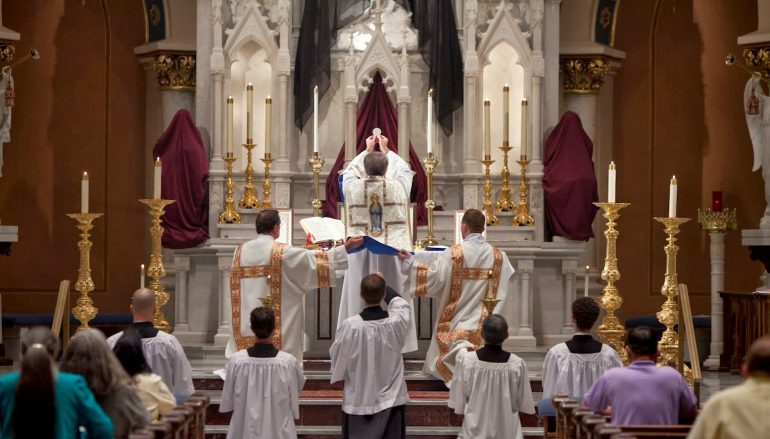I have a dear friend who is a liturgical Nazi. This may not sound like a compliment, but I mean it affectionately.
There is an old joke that begins: “What is the difference between a liturgist and a terrorist?” Answer: “You can negotiate with a terrorist.”
Now, as a professor who teaches moral theology, I should point out there is a second part of that joke. “What is the difference between a terrorist and a moral theologian?” Answer: “You can negotiate anything with a moral theologian.” We all have our strengths and weaknesses.
To her credit, my friend took the liturgy very seriously. She studied it; she planned carefully; and she had a clear vision of how she thought it ought to be done so that it was both reverent and appropriately participatory. She abhorred lectors who read too softly or couldn’t pronounce the words. Ad hoc, unstructured, rambling homilies were not what she expected at Mass, and it disappointed her when priests just “went through the motions.”
Her one big fault, to my mind, was that she was so particular about what she wanted liturgy to be that she would sometimes violate provisions of the General Instruction on the Roman Missal, the basic guidelines governing how the Mass is to be done.
This bothered me, so I asked her one day: “How do you expect the congregation to obey your authority and obey your directives to the letter [she used to write out her rules] when you don’t obey the authority you are under?” She never had a very good answer to that question, other than: “But this is good liturgy.”
“I understand that,” I would say; “good liturgy as you understand it. But you are part of a larger whole, just as the people who serve as lectors or who do the music in the Mass have to understand themselves as part of a larger whole. You don’t allow them to just do what they want, no matter how ‘enlightened’ they imagine themselves to be.”
Yes, but she was a trained liturgist. She had studied extensively and had an advanced degree from an important university. “Sure,” I said, “but so have a lot of the bishops and those who advise them on the liturgy.”
After some back-and-forth on the ignorance of bishops (Had I ever met a bishop who knew the first thing about liturgy?), I said, “The point is, you and they are part of a community of believers, the Church. You tell me all the time that this is the key to good liturgy. The liturgy is not the place for creative individualism. If we are to be a community and engage in collective actions together rather than just individual actions that we happen to do in each other’s presence, then we must obey the authority that brings us together and makes us one: the Scriptures, tradition, and apostolic authority on which the Church is founded. You can’t just go off on your own and do your own thing. I mean, who do you think you are? The German Catholic Bishop’s Synod?”

Okay, I didn’t say that last part about the German Bishop’s Synod. This conversation with my friend was years ago, long before certain German bishops decided they were so smart and so sensitive they could tell the rest of the Church how to organize their affairs, even though their churches were empty.
But just as with my friend, I am still left wondering about these bishops: “How do you expect anyone to respect your authority when you don’t respect the authority you are under? I don’t just mean the authority of the pope and various Vatican officials who have told the German bishops that their current plan for a “binding” synod, which includes German government officials is illicit.
Instead, the authority of the Scriptures, tradition, and magisterial authority laid down over the centuries to which they supposedly pledged their fidelity, is the sole source of their authority.
Bishops are not supposed to just make things up as they go along, however smart and sensitive they imagine themselves to be. They serve a higher authority. The Second Vatican Council’s Dogmatic Constitution on Divine Revelation (Dei Verbum) states clearly that, “This teaching office [of the Church] is not above the word of God, but serves it, teaching only what has been handed on, listening to it devoutly, guarding it scrupulously and explaining it faithfully in accord with a divine commission and with the help of the Holy Spirit, it draws from this one deposit of faith everything which it presents for belief as divinely revealed.”
As I tried to explain to my friend, “The only reason anyone in this congregation listens to you or does what you say is not because of your expertise in liturgy, but because they believe you are faithfully representing to them the teachings and directive of the Roman Catholic Church. If you don’t, they will abandon you.”
So too with our dear German bishops. The only reason anyone would listen to these rather unremarkable men is the belief that they faithfully represent the teachings of the Catholic Church from Christ down to the present times. To act contrary to the authority you are pledged to serve and that serves as the sole foundation for your authority is like sawing off the branch on which you are sitting. You may be sitting high now, but once you saw through that branch, then where will you be?
But look, if the German bishops want to go their own way, then God bless them. I mean, as long as they give back the churches that generations of Catholics sacrificed to build. You make your own church, you build your own buildings. Where, gentlemen, did you get the idea that these churches “belong” to you? Probably the same place you got the idea that the Church “belongs” to you. This may come as a shock, but they don’t, and it doesn’t.















